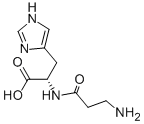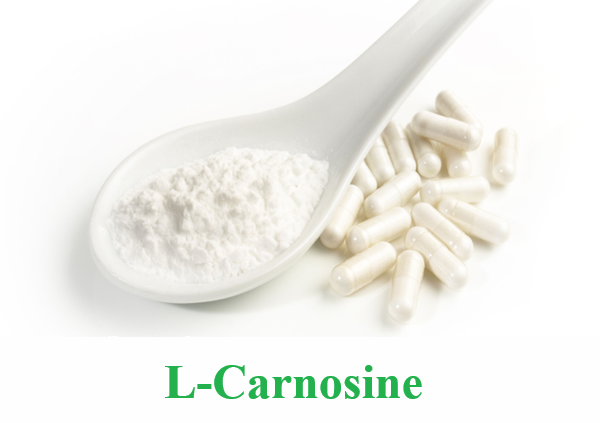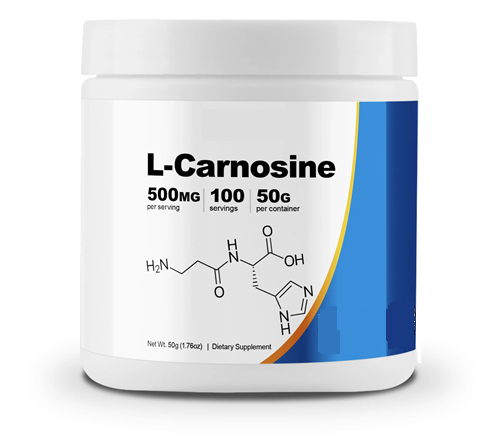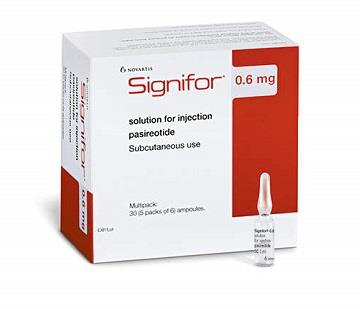What is L-Carnosine?
L-Carnosine is a naturally-occurring histidine-containing compound and the biological role of this dipeptide is to act as cytosolic buffering agents. Other roles ascribed to L-Carnosine include action s as neurotransmitters, modulation of enzymic activities and chelation of heavy metals.
L-Carnosine (β-alanyl-L-histidine) is a dipeptide of the amino acids beta-alanine and histidine. Carnosine is found throughout your body. The highest concentrations are in high energy demand areas such as your brain, heart and muscles. (Don’t mistake l-carnosine for l-carnitine).
L-Carnosine is known as the ‘longevity molecule’ and targets several major processes in your brain and body. It removes heavy metals which accumulate in, and damage brain cells causing diseases like Alzheimer’s. And it prevents cross-linking of proteins which cause the neurofibrillary tangles found in Alzheimer’s.
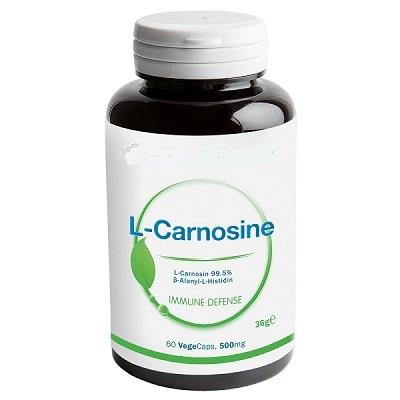
Pharmacological effects
Carnosine is a protein building block that is naturally produced in the body. It is found in muscles, the heart, brain, and many other parts of the body.
Carnosine is important for many normal body functions. There's interest in using it to prevent aging because it seems to block certain chemicals that might play a role in the aging process. Carnosine levels in the body might also go down with age.
People use carnosine for aging, diabetes, autism, heart failure, depression, and many other conditions, but there is no good scientific evidence to support these uses. Carnosine is also called L-carnosine. Don't confuse this with L-Carnitine. These are not the same.
Many studies have found that n-acetyl carnosine has good effect on prevention and treatment of cataract, one of them, according to a study by carnosine can improve as a result of exposure under the guanidine lens opacity of cataract in rats, although they support carnosine can treat cataract and other hypothetical benefits of eyes, but so far, It has not been fully supported by the mainstream medical community, such as the Royal Ophthalmology, which has declared that carnotin is neither safe nor effective in the topical treatment of cataracts.
Health Benifits
L-Carosine is a dipeptide found at millimolar concentration in brain, muscle and the lens of the eye. In model systems it is a potent antioxidant that scavenges oxygen free radicals and transition metal ions. It blocks protein-protein and protein-DNA cross-links induced by hypochlorite anions and toxic aldehydes such as acetaldehyde, formaldehyde, and malondialdehyde, the primary product of lipid peroxidation. It also inhibits nonenzymatic protein glycation induced by aldose and ketose reducing sugars and inhibits the formation of toxic advanced glycation end products (AGE). These activities make it of interest in studies of aging, atherosclerosis, Alzheimer′s disease, and the secondary effects of diabetes.
L-Carnosine improves cognition
Animal and human studies suggest NMDA antagonists worsen executive function. This dysfunction is often caused by glutamate toxicity. And if this persists, you end up with diseases like schizophrenia.
This double-blind, placebo-controlled study worked with 75 adults with schizophrenia. They were stable in their symptoms at the time of the study. Subjects were randomly selected to receive 2 grams of l-carnosine per day for 3 months.
Executive dysfunction, memory, attention and motor speed were assessed at the beginning, and at 4 and 12 weeks. The l-carnosine group performed much better in executive function tests. And were better at strategy with fewer errors than the placebo group.
L-Carnosine improves autism symptoms in children
L-Carnosine enhances frontal lobe function in your brain. And acts as a neuroprotectant. It also works with GABA for an anticonvulsive effect.
This double-blind study work with 31 children with autism for 8 weeks. They were given 800 mg of l-carnosine per day. The scientists then used several autism rating scales to measure results.
After 8 weeks of l-carnosine use, the children showed significant improvement in behavior, sociability, communication and vocabulary. The researchers concluded that l-carnosine enhanced neurologic function.
L-Carnosine is anti-aging
In 1965, Dr. Leonard Hayflick found that human cells have a limited capacity to divide. After which they become ‘senescent’. This is now known as the “Hayflick Limit”. Hayflick discovered that your cells go through 3 phases. This first is rapid cell division called ‘mitosis’. The 2nd is where mitosis slows. And the 3rd stage is ‘senescence’ where the cell stops dividing entirely. They remain alive for a while and then do a particularly disturbing thing. They commit suicide. This programmed cell death is called ‘apoptosis’.
This cell life cycle occurs throughout your body and its trillions of cells. Including in your brain. But what if there was some way to slow down this programmed cell death?
Turns out there is. And it’s called L-Carnosine. Researchers at Sydney Laboratory in Australia found that l-carnosine extended cell life. They put cultured aged human cells in a petri dish with carnosine. The cells reverted back to juvenile cells.
You may like
Related articles And Qustion
Lastest Price from L-Carnosine manufacturers

US $0.00/KG2026-01-14
- CAS:
- 305-84-0
- Min. Order:
- 20KG
- Purity:
- 99.99%
- Supply Ability:
- 1000 KG
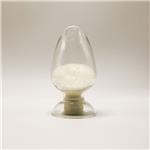
US $500.00-500.00/kg2025-10-10
- CAS:
- 305-84-0
- Min. Order:
- 1kg
- Purity:
- ≥99.00%
- Supply Ability:
- 1000000
